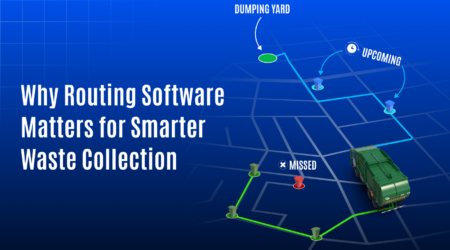How can CO2 emission tracking boost sustainability in the Netherlands?
The Netherlands is well known for its environmental sustainability consciousness, reaching the highest climate ambitions for global leadership. In the last few years, the country has achieved important progress, for instance, a 25% reduction of Co2 emissions compared to 1990 targets. Although great successes have been achieved, transport, agriculture, and energy industries remain significant sources of Co2 emission. Thus, innovative approaches are urgently needed to reduce the emission of these sectors.
To reach the desired Co2 emission reduction target of 55% by 2030, Dutch companies and sectors of activity are under pressure to change. Emission tracking software for Co2 appears as a breakthrough. It is empowering companies with real-time information that is held- to a high degree- with the possibility to optimize their workflows and contribute to a more green future. In this blog, we will talk about the crucial role of emission monitoring communication in the path to sustainability and how companies in the Netherlands can leverage the latest software in order to reach their goals.
The sustainability landscape in the Netherlands
Current Co2 emission challenges
Although advances have been made, the Netherlands continues to struggle controlling emissions. The struggle is faced, especially in priority sectors such as transport, agriculture, and energy. Transportation emissions, in particular, are responsible for almost 20% of Co2 emissions in the nation, which freight vehicles and urban commuters are responsible for heavily.
Government policies and targets
The Dutch government has ambitious policies, such as the Energy Agreement and the Climate Agreement, in order to move towards greener options. These policies are pushing companies to adopt sustainable practices, however, precise monitoring of Co2 emissions is still a challenge for many companies.
The role of businesses in achieving net-zero
Industries are pivotal to achieving the country’s sustainability targets. Across logistics and manufacturing, Dutch companies are facing growing calls to report transparently and reduce emissions. Such change requires the utilization of effective instruments to monitor and control Co2 emissions.
Why accurate Co2 emission tracking matters
Precise Co2 emission monitoring underlies all good sustainability initiatives. It allows businesses to:
Traditional approaches such as hand calculations or simple spreadsheets tend to be insufficient to provide insightful and actionable information. Here, dedicated tracking software can play a role.
The role of Co2 emission tracking software
To address the problems of the manual accounting of huge amounts of data as well as of outdated technologies, Co2 emission monitoring through software is a modern alternative. Here’s how it makes an impact:
Real-time monitoring
Advanced software provides live updates on emissions through the fuel monitoring feature. This gives businesses immediate visibility into their carbon footprint. Real-time data such as this enables them to act quickly to counter inefficiencies.
Customizable reporting
Emission tracking software generates tailored reports for different stakeholders. Managers can all benefit from a wealth of information to support sustainability initiatives, and the compliance departments can just generate reports required by the Dutch government. These reports simplify communication and foster transparency.
Integration with existing systems
Modern software integrates seamlessly with tools. Businesses already use fleet management systems or energy monitoring platforms which can be connected using API’s. This ensures a unified approach to sustainability, saving time and resources while delivering complete insights into emissions.
The benefits of Co2 emission tracking software
Using specialist software offers a range of benefits that allow companies to advance towards their sustainability targets.
Enhanced operational efficiency
Business is able to draw data on inefficiencies that lead them to optimize processes and to reduce unnecessary emissions. This enhances work efficiency while remaining environmentally friendly.
Simplified compliance
Automatic reporting tools help businesses comply with regulatory requirements easily. This reduces administrative burden and enables companies to dedicate their efforts and resources to sustainability rather than to administrative tasks.
Cost savings
Emission reductions are typically accompanied by cost savings. Whether it’s through better fuel efficiency or optimized energy usage, businesses can cut expenses while achieving their environmental objectives.
Improved stakeholder relationships
Exhibiting a dedication to sustainability is one of the ways to further strengthen relationships with customers, partners, and investors. Openness in the form of status reports creates trust and the impression of a forward-looking company.
Future-proof planning
Using such fleet management software, enterprises can prepare for the future growth and sustainability of their portfolios. From implementing renewable energy or pursuing new technologies, data-driven planning underwrites companies’ ability to respond to future challenges.
The future of sustainability in the Netherlands
The Netherlands is at a promising course towards meeting its climate targets, but companies need to be actively involved in proceeding in this ecological mission. Co2 emission tracking software is an important system for companies to play a positive role. Therefore, by investing in pioneering solutions, companies can minimize their carbon footprint.
Conclusion
Co2 emission monitoring is of great importance in the realization of sustainability targets in the Netherlands. Using software, companies can keep track of emissions, use resources in an optimal way, and easily fulfill strict regulations. In addition to emission reduction, these tools help to improve operations, improve brand reputation, and help to save money. With the Netherlands aiming at ambitious climate KPIs, companies will have to actively contribute to the reduction of carbon footprint. To investors in Co2 emission tracking software, this means that corporations can be part of a sustainable future without sacrificing relevance or being out of step with government regulation. Use the available technologies today to pave the way for sustainable growth and environmental consciousness.


